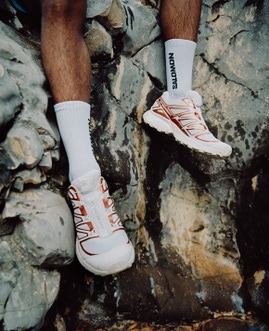What if your running shoes could be reincarnated—brought back to life as a new piece of sports equipment that you could use to have more fun outside. What if—when you had worn them down from all that healthy running you do—you could give them back to whoever you bought them from (preferably Salomon), and they could become something else? Like, for instance, a ski boot.
Engineers at Salomon’s Annecy Design Center (ADC) in the French Alps are busy imagining scenarios like this, and today their imagination and years of experience across both footwear and winter sports has led to the unveiling of a new concept running shoe that could help lessen the environmental impact of footwear. The running shoe is made completely of thermoplastic polyurethane (TPU), which can be ground down at the end of its life, then combined with original TPU and used to construct an alpine ski boot shell.
As a leader in running and the world’s largest ski boot manufacturer, the concept shoe provides a uniquely Salomon solution to footwear sustainability that extends the life-cycle of the materials used to create the shoe. Though it is a concept at this point, the shoe offers a glimpse into how Salomon may be able to tackle circular economy principles in the future across various product categories inside the brand. The company’s footwear team is working to implement elements of this concept in running footwear that will be available to consumers in 2021. The concept for a fully recyclable running shoe is the first step in Salomon’s commitment to have 100 percent of its new products designed to one or several of the company’s circular economy principles by 2025.
“We recognize that we have to do better for the environment by creating Salomon footwear that drastically reduces its impact on the planet,” says Guillaume Meyzenq, VP of Salomon Footwear. “By creating this concept shoe that can be recycled into a ski boot shell, we are showing that it is possible to find alternative materials to create performance footwear. It’s an exciting development that will help lead us to more sustainable footwear solutions in the future.”
THE CONCEPT
The key ingredient in the recipe of the recyclable Salomon concept shoe is thermoplastic polyurethane (TPU). Instead of using multiple materials to create the shoe, as is the case in the construction of traditional athletic performance footwear, the concept shoe uses only TPU to construct both the upper and the bottom units. This innovative construction enables the grinding and the re-use of the raw material without downgrading the performance.
THE PROCESS
When the running shoe reaches the end of its life, Salomon is able to clean it and grind it into tiny pieces. These tiny pieces of TPU are then mixed with a bit of original (new) TPU and inserted into an injection machine to become a ski boot shell. The final ski boot shell has all the same performance characteristics as traditionally produced ski boots in the current Salomon range, which already use recycled plastics.
WHY IS THIS BETTER FOR THE ENVIRONMENT?
Most traditional footwear construction relies on multiple materials such as cotton, polyester, EVA (Ethyl Vinyl Acetate) and rubber. Using multiple materials requires glue and stitching to bind those materials together. That makes most footwear nearly impossible to fully recycle because the materials must be separated from each other and the glue somehow extracted. In fact, roughly 30 percent of the global environmental impact caused by the footwear industry is due to the raw materials used in the products. Additionally, less energy consumption and no materials are wasted in the creation process of the Salomon concept shoe. Everything is utilized in the shoe.
AND THE RUNNING PERFORMANCE?
To ensure that the upper of this concept shoe is breathable enough to run in, Salomon engineers relied on two kinds of thermoplastic polyurethane (TPU). One has an extremely lightweight, almost transparent appearance to it. The bottom unit offers cushioning that performs better than the EVA foam currently being used in most running footwear.
“As a leader in running and the largest ski boot manufacturer, this is a unique Salomon solution to footwear sustainability that extends the life-cycle of the materials used by up to 10 times and drastically reduces the effect on the environment,” Meyzenq added. “Our work is always evolving in this area and it will be a never-ending journey, but this is an exciting step forward that will help us find solutions in the future.”












